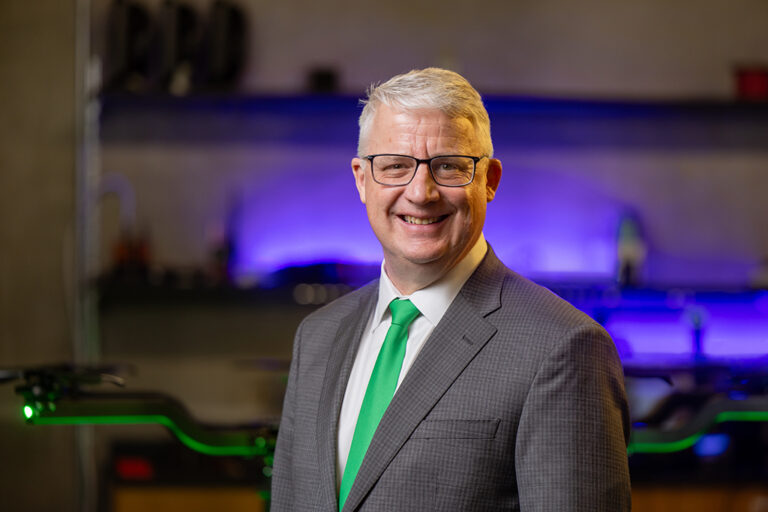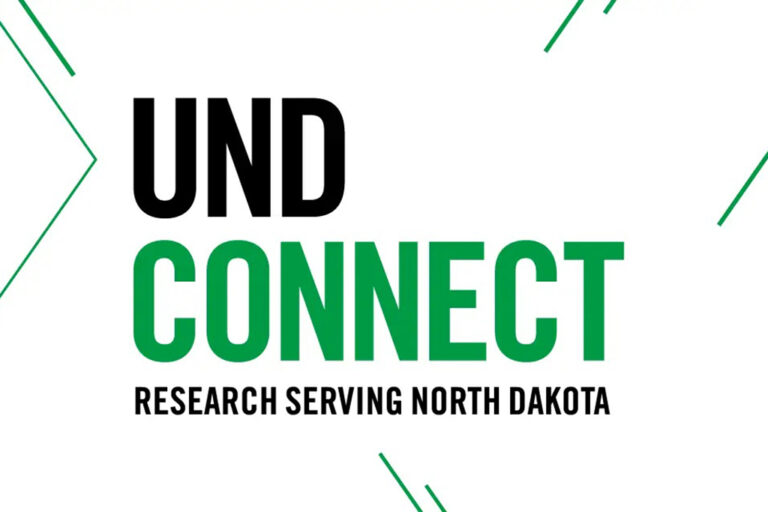Gaming for impact
UND medical researchers develop video games to raise awareness about the dangers of radon

“Everyone knows it’s no longer okay to expose your children to cigarette smoke in the home,” begins Gary Schwartz, epidemiologist and professor of Population Health at the UND School of Medicine and Health Sciences, “but your house could have high levels of radioactivity in the air from radon gas, exposing your family to the equivalent of several packs of cigarettes each day, and many people do nothing. That’s a problem.”
According to Schwartz, while the colorless and odorless gas known as radon—prolonged exposure to which causes an estimated 21,000 deaths each year from lung cancer—is present in high levels in only four percent of homes nationwide, high levels can be found in 61 percent of homes in North Dakota.
Compounding the tragedy is that most of those 21,000 deaths are preventable because radon levels can be reduced by venting radon gas out of the home, which often can be accomplished for less than $1,000.
Yet, hundreds of educational and awareness programs targeted at adults over the years have had little effect on reducing the population’s overall radon exposure—most still don’t know much, if anything, about radon. “It is a kind of chicken-or-egg problem; many homeowners don’t know about the dangers of radon so they don’t seek out educational materials with what little time they have for such activities,” Schwartz said.
So how can we reach these adults?

Collaborative idea
Richard Van Eck, hired the same year as his colleague, met Schwartz for coffee in 2015 to discuss the possibility of collaborating on a radon education project and got an education of his own.
“Gary told me about how prevalent radon was in North Dakota, what its health effects are, and how his house had high levels,” says Van Eck, professor of Population Health and Associate Dean for Teaching and Learning and the David and Lola Rognlie Monson Endowed Chair in Medical Education at the SMHS. “I had no idea how serious it was. My next question was, ‘how do I get my house tested?’”
This conversation got the researchers thinking about different ways to reach out to the public. Van Eck, who came to the SMHS hoping to leverage his background in education and instructional design on new ways of teaching future health care professionals, suggested the idea of developing a product targeted at middle-schoolers. He also sought to use a different approach to radon education: games.
To that end, the pair applied for and were awarded a small business innovation research grant from the National Institutes of Health.
Extra-terrestrial influence
The result of the researchers’ collaboration is the Radon Awareness Health Initiative (RAHI). In the two-tiered program, students first learn about radon and its health effects through classroom instruction and then learn how to apply and deepen their knowledge through the Web-based game to extend their classroom learning.
As Van Eck, who has studied games and learning for 20 years, explains, “This project used game-based learning— the act of aligning computer games with learning in the way youth prefer to engage with content. It’s not just about appealing to students, though. Games can and do help students transfer ‘inert’ science classroom knowledge into tangible, real-world actions.”
In the game, students help a group of extraterrestrials, the “Rahi,” whose spaceship has crashed on Earth and who need help finding their rescue ship on the other side of the city. The problem is that Rahi are extremely sensitive to radon—even a few seconds of exposure at levels above four parts per million per cubic liter of air (the current level recommended by the EPA for remediation of homes) can kill them. The Rahi educate students about radon and students learn to apply that knowledge by helping the extraterrestrials find the RAHI rescue spacecraft, using a radon-testing apparatus to chart a safe, radon-free path through the community.
“The kids can see, in real-word terms, what the levels of radon are in various homes or neighborhoods and how the level changes,” adds Van Eck. “That sort of hands-on immersion is a way for students to learn this conceptual knowledge in a way that is deeper than asking them to simply memorize facts about radon.”
Testing phase
This first phase of the project, which is being developed in partnership with Triad Interactive Media, an award-winning media services company focused on the design and development of learning and training media, will be tested in seventh-grade health education classrooms in Grand Forks. The program will then be distributed throughout North Dakota and other states in a later phase.
For its part, the North Dakota Department of Health (NDDOH) in Bismarck provides easy-to-use home radon test kits to North Dakota residents free of charge. To request a test kit, call the Department of Health at 701.328.5188, or e-mail: jotto@nd.gov. Test kits also may be available for purchase at local hardware stores, building supply stores, or local public health departments.
Back in Grand Forks, Schwartz and Van Eck hope to equip a generation of future homeowners with the knowledge they need to keep themselves and their homes safe from radon. “Once we have people’s attention, it does not take much to create that ‘ah-ha’ moment,” Schwartz concludes, “to convince them that radon is a real threat that can and should be remediated.”
This article first appeared in the Holiday 2017 issue of North Dakota Medicine magazine.


